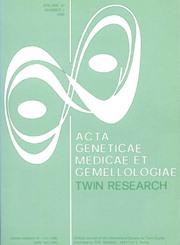Article contents
Down's Syndrome and Maternal Inbreeding*
Published online by Cambridge University Press: 01 August 2014
Summary
In order to test the possible effect of maternal inbreeding upon non-disjunction, ancestors of 104 children with Down's syndrome born to younger mothers were identified on the basis of official records. Among them, 6 had related parents, while 10 of the fathers and 12 of the mothers had also such parents. The relationship comprises first-cousins, first-cousins once removed, and second cousins. It was concluded that recessive genes are unlikely to be involved in the aetiology of non-disjunction of the 21st autosome, at least in younger mothers.
- Type
- Research Article
- Information
- Acta geneticae medicae et gemellologiae: twin research , Volume 15 , Issue 3 , July 1966 , pp. 224 - 230
- Copyright
- Copyright © The International Society for Twin Studies 1966
Footnotes
This paper is dedicated to Professor Dr. O. Frhr. von Verschuer in honour of his seventieth birthday. Contribution no. 618 from the National Institute of Genetics, Japan.
References
- 6
- Cited by




